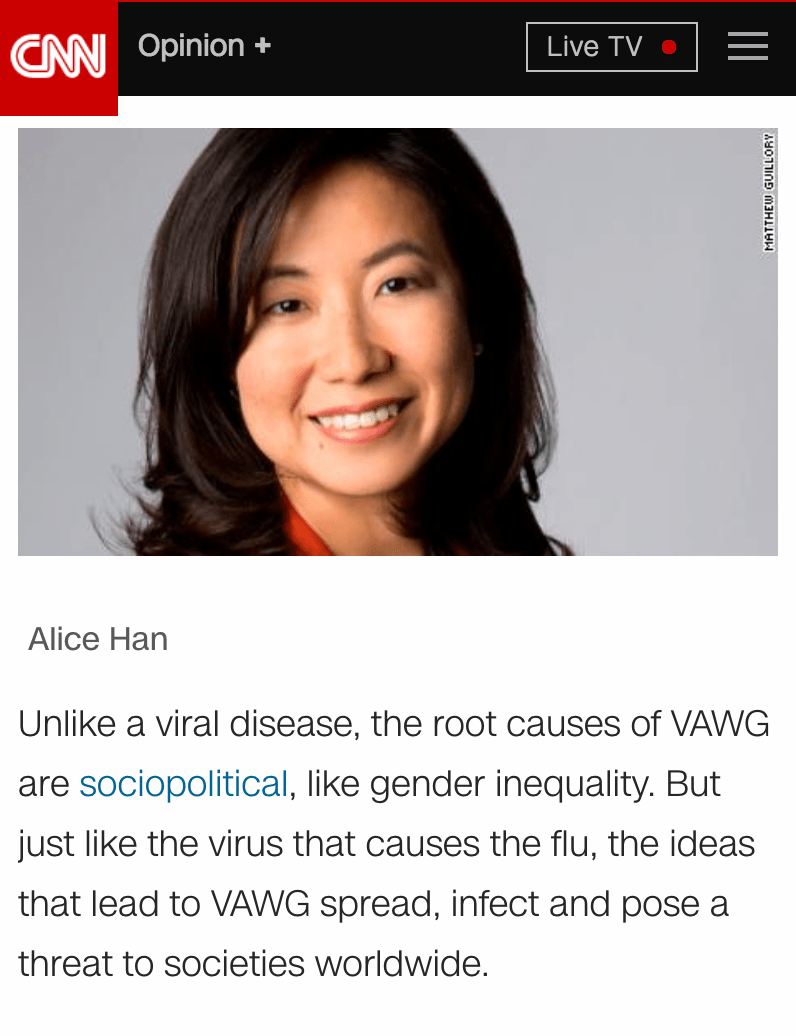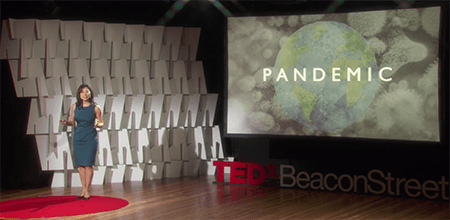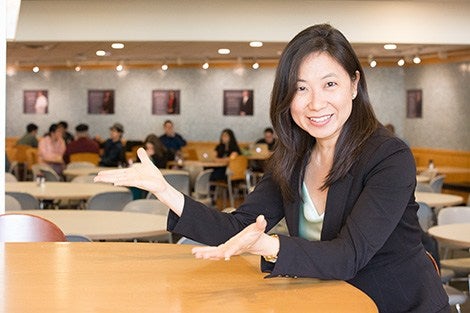Alice Han, MPH ’18, sees violence against women and girls as a pandemic. She advocates fighting it like you’d fight a virus—but with education, not a syringe
May 24, 2018 – Sometimes when obstetrician and gynecologist Alice Han talks with people about the subject of violence against women and girls, she sees them shift about nervously.
“Any time you talk about things like sexual violence, it can make people uncomfortable,” she said. “It used to make me uncomfortable too.”
Her discomfort didn’t last. The more Han learned about the issue—in particular, how prevalent it is, with one in three women around the world experiencing certain types of it during their lives—the more she felt compelled to do something about it.

Last November, she did. She gave a well-received TEDx Beacon Street talk on violence against women and girls, or VAWG. And in March she wrote an op-ed about VAWG for CNN.
Han, who will graduate this month with a master’s in public health (MPH) in clinical effectiveness from Harvard T.H. Chan School of Public Health, plans to continue speaking up about VAWG. She said that experts have made great progress in recent years in addressing VAWG through research that quantifies and qualifies the problem and by developing strategies for prevention. But she thinks that the general population tends to see it as a “messy” problem that’s difficult to address—so it often gets ignored.
Han thinks more can be done. She wants to bring VAWG front and center, reframing it as a pandemic so that the world begins to address it through a global commitment, in the same way it addressed scourges such as smallpox, polio, and Guinea worm disease. Viewing VAWG as a pandemic makes sense because the ideas underlying its root causes, such as gender inequality, can spread like a disease, said Han—for example, boys who see their fathers abusing their mothers are more likely to grow up to be abusive in their own relationships.
“Just like we vaccinate for other diseases, we can vaccinate for VAWG—through education and training,” she said in her TEDx talk.
Shocking statistics
Growing up in Canada as the daughter of Korean immigrants, Han was aware that social determinants of health—such as not speaking English as a first language—left certain groups at a disadvantage. During her medical school training at the University of Toronto, for example, she met an elderly Korean patient and his wife who teared up when she began speaking in Korean, expressing how grateful they were to encounter a health professional who spoke their language.
As an undergraduate at McGill University, during a 2001 visit to Vietnam to learn about issues such as maternal mortality and morbidity, she saw widespread poverty and lack of access to health care. After college, she completed an internship focused on health equity issues, working both in Canada and Brazil. She went on to earn a master of science in clinical epidemiology from the School of Public Health at the University of Alberta, Edmonton.
During her medical school residency, one of her mentors was Donna Stewart, a women’s health expert studying intimate partner violence against women and girls in Latin America and the Caribbean. Han began reading research about the topic and found statistics—from Brazil in particular—that shocked her.
“One study reported that over 50% of women experienced this type of violence,” she recalled. “When I thought back to my time in Brazil, in a culture I’d loved, where I met so many people and was received so warmly, and then realized that one in every two of the women that I passed on the street was experiencing this violence—that for me was a pivotal moment.” Han wound up collaborating with Stewart, serving as lead author on a 2014 paper on maternal and fetal health outcomes related to violence during pregnancy in Latin America and the Caribbean.
“The work really crystallized for me that this is a topic of relevance for OB/GYNs, and for other medical professionals as well,” Han said.
After her residency, Han spent a year working for Partners in Health as a women’s health clinical advisor at Rwinkwavu Hospital in the Kayonza district of Rwanda. While there, she organized a training session for local health professionals on gender-based violence (GBV) that covered topics such as how to conduct an exam after a rape, the health impacts of sexual violence, and political and legal issues regarding GBV in Rwanda.
It was gratifying for Han to share her knowledge with Rwandan doctors, nurses, and social workers. But she wanted her work to have wider impact. “I remember feeling ineffective at times as a clinician because I saw that improvements were needed upstream at the level of health systems to deal with the problem of violence against women,” she said.
Health care barriers
Over the past two years in Boston, Han has worked part-time as a physician at the Dimock Center in Roxbury, a community health center, while pursuing her MPH. Working at Dimock with many Hispanic immigrant women, Han sees firsthand the barriers to health care access faced by underserved groups, including lack of health insurance and delays in addressing health issues because of an inability to get child care or time off work.
At Harvard Chan School, she gained expertise that will help her transition into the research or policy arenas. A course taught by Stephen Marks that focused on the way international institutions such as the United Nations deal with health and human rights issues helped Han understand how to frame VAWG in a human rights context, she said. A course on persuasion that she took at Harvard Kennedy School helped her prepare for her TEDx talk, she said.

Getting ready for the 14-minute talk, held at a school in Brookline, Mass., took four months. Han felt uncertain about her audience’s reaction to her talk because the spotlights made it hard to see their faces. But a friend later told her that it was the first time he’d seen an entire audience put down their phones and lean in to listen to a talk about gender justice. “The reaction has been really fantastic,” she said.
Her talk led to new opportunities—for instance, in June, she will participate in a World Health Organization-sponsored training session in Geneva on WHO guidelines, tools, and methodologies related to the health sector response to violence against women.
Han will continue to work at Dimock through part of the summer while exploring other opportunities to address VAWG, using her clinical expertise as well as the research, communication, leadership, and advocacy skills she has gained at Harvard Chan School. Although she finds it immensely gratifying to work one-on-one with patients, she may eventually pull back on her clinical work because she feels a strong draw toward making a bigger impact. In the future, she envisions leading studies, organizing conferences, planning trainings for health providers, advocating for policy changes to improve health sector response, or speaking to global audiences about VAWG.
“I want to communicate about something really uncomfortable—an issue that’s been historically unacknowledged and stigmatized—and help advocate for an improved health system response to this public health problem,” she said. “Because the time for change is now.”
feature photo: Sarah Sholes
